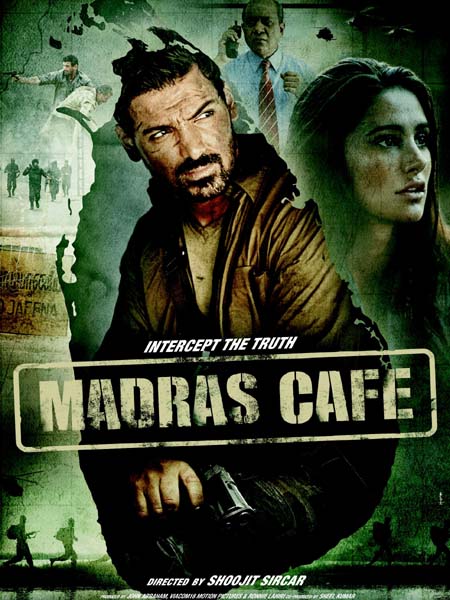



Madras Café
Year: 2013
Director: Shoojit Sircar
Cast: John Abraham, Nargis Fakhri
After hitting the bull’s eye through Vicky Donor, their first creative collaboration, producer John Abraham and director Shoojit Sircar decided to join hands together to make Madras Café, a film on the LTTE struggle and Rajiv Gandhi assassination. The decision came as a surprise because moving from a light-hearted (yet insightful) film such as Vicky Donor to such a socio-politically charged project dealing with guerilla war and terrorism was a risky proposition. The immediate knee-jerk reaction banning the film in Tamil Nadu proved that the risk was for real. But still the duo went ahead and made the film, with John even carrying the added responsibility of playing the central character. So how does their daring effort come off?
What’s the plot?
From the mid-seventies the ethnic struggle between the Sinhalese and Tamil communities in Sri Lanka went on becoming more and more bloody and bitter. The Tamils led by Prabhakaran raised a militant outfit called LTTE (Liberation Tigers of Tamil Eelam) demanding a separate state and engaging in guerilla warfare with Sri Lankan army. After initially playing a covert supporting role, Indian government agencies washed their hands off LTTE and decided to help Sri Lankan government to find a peaceful political solution. In the mid-eighties India sent a peace-keeping force to control the Tamil insurgents. But the Indian intervention only made the situation worse and turned LTTE against them. This cat-and-mouse covert war finally led to emergence of LTTE’s suicide bomber squads, which unfortunately resulted in Indian ex-prime minister Rajeev Gandhi’s assassination at an election rally.
Madras Café tells the story of this largely ignored piece of Indian history; obviously it does so by changing names and staying clear of controversies. The story is told from the viewpoint of a senior Indian intelligence officer (John Abraham), who is sent in Sri Lanka to help quell the militant menace and find a political solution. But what awaits him is a treacherous path full of betrayals and backstabbers!
What’s hot?
· Capturing such a bloody militant battle and the behind-the scenes maneuvers was a monumental task. But Sircar manages to do that convincingly. The battle-scenes, espionage activities, government agency tangles and suicide bombing – every aspect of the story translates realistically on screen.
· John Abraham delivers an impressive, measured performance and he is ably supported by other actors like Nargis Fakhri (playing a foreign news correspondent), Rashi Khanna (playing John’s wife) and Siddharth Basu (playing John’s boss).
What’s not?
· The story-line steers clear of Indian complicity in the whole LTTE saga.
· The flashback narration does not make much sense.
Verdict
Madras Café tackles a relatively unknown but important chapter of post-Independent Indian history and does so quite credibly. It hasn’t really gone all the way in exposing various factors that led to complications in the handling of LTTE struggle and ultimately resulted in Rajiv Gandhi assassination. But still it must be said that the film has turned into an intriguing, thought-provoking espionage-war drama.
It is certainly a must-watch movie!
Rating
4 stars